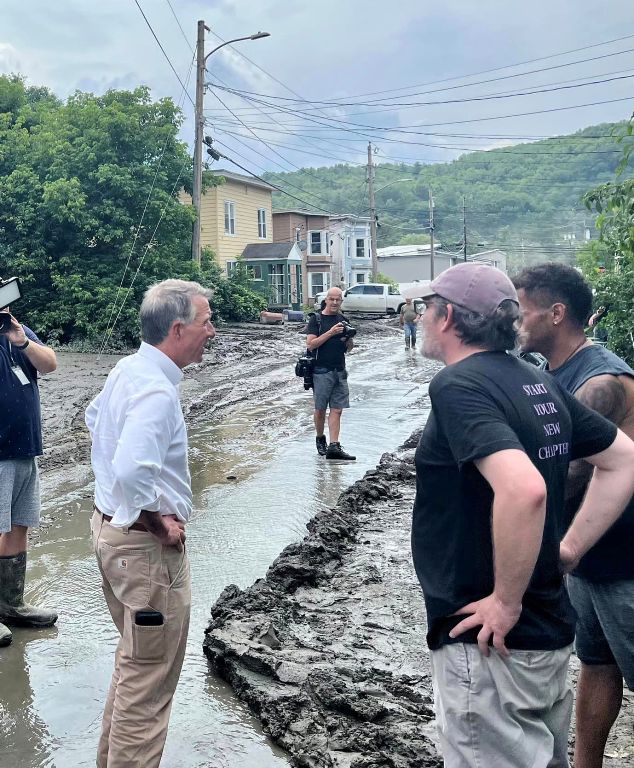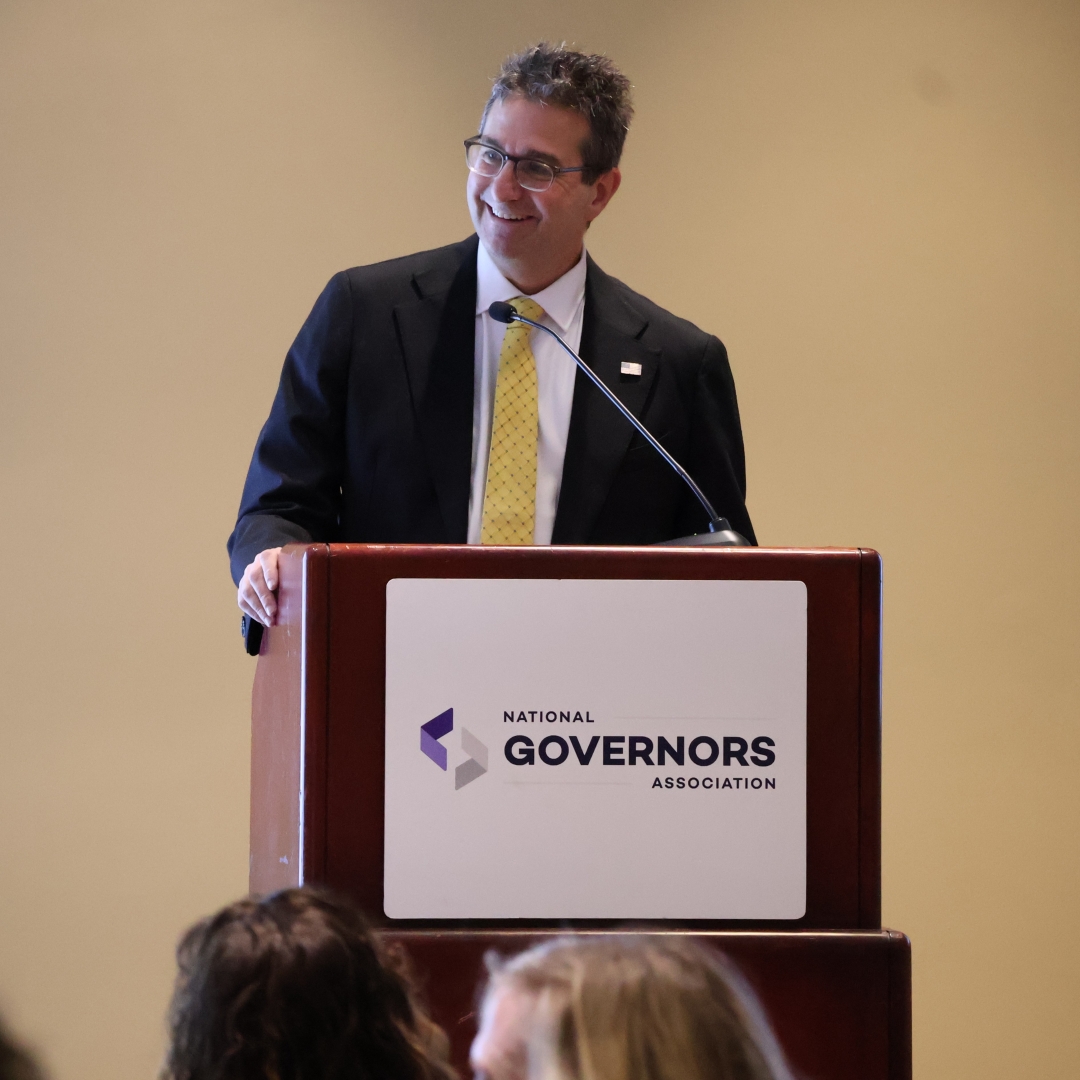To help commemorate National Public Health Week 2025, this publication is part of a NGA series that explores policies, programs and considerations to improve population health.

As natural disasters and extreme weather continue to impact states across the country, local and state health departments can better integrate mental health services and support into their emergency response and preparedness protocols. Research indicates that children, adolescents and older adults are most susceptible to mental health challenges in the event of a natural disaster as changes in weather patterns and climate continues to evolve. Governors have unique roles responding to severe weather events that affect their states, including considering how such disasters can affect residents’ mental health.
Acute weather changes or sudden natural disasters such as hurricanes, blizzards and wildfires can cause changed behaviors such as stress, insomnia, depression and anxiety in affected individuals. Conversely, the impacts of gradual changes in climate, such as prolonged droughts and heat disasters, can harbor longer-term ripple effects in individuals, local communities and states.
Mental Health Implications of Extreme Weather Events
The damage inflicted by a natural disaster does not only affect the physical environment of the community in which it hits. These events can have a significant impact on mental health within the community as well. Stressors such as losing a house, business or community member can lead to depression, anxiety and post-traumatic stress. Additionally, as severe weather events become more frequent, their repeated occurrence can lead to cumulative community stress, increased levels of poverty due to the loss of a business or office, an increase in domestic violence, and increased high-risk coping behaviors such as alcohol use.
When a significant weather event occurs, it influences the whole community. However, youth populations and first responders experience unique mental health implications. Children who have experienced a major weather event are likely to have trauma related symptoms due to disruption in routine or separation from their caregiver as a result of displacement and may take on additional stress from their parents. First responders and emergency workers are also in a unique position because they may be both responders and victims. Therefore, along with the stressors of being victims to a major weather event, they are also exposed to the dangers of responding to the disaster, placing themselves at an increased risk to injury and potential death.
State Spotlight
States maintain a numerous mental health services and supports that can be offered to victims after emergencies and natural disasters, ranging from crisis counseling and stress management to national and local helplines.
Hawai‘i

The Maui wildfires of 2023 left a devastating toll on the state infrastructure, communities and natural environment of Hawai‘i, resulting in over 100 deaths and a major disaster declaration by the Biden Administration. The destruction encompassed the loss of housing, employment, cultural sites, and an increased risk of suicidality and mental health challenges that strained Hawai‘i’s emergency response and recovery initiatives. Survivors commonly reported post-traumatic stress disorder (PTSD), depression and anxiety after the wildfires. The event also exacerbated existing mental health conditions that may increase the need for longer-term healthcare.
To strengthen mental and behavioral health support, Hawai‘i Governor Josh Green and the Department of Health highlighted the Office of Wellness and Resilience which provides on-the-ground mental health services. The resources encompass the Hawai‘i CARES 988 hotline, in-person support at Maui Community Health Centers, telehealth, Hazel Health for Hawai‘i’s public-school students in partnership with the Hawai‘i Department of Education, and behavioral health support provided by Kaiser Permanente.
Vermont

In 2023 and 2024, Vermont experienced significant flooding events. These floods impacted seven of Vermont’s 14 counties. The floods destroyed homes, businesses and infrastructure, causing an estimated $63 million in insurance claims, $153 million in state and local costs and $603 million in federal outlays. At the federal level, in response to a request from Governor Phil Scott, President Biden approved an emergency declaration for the state.
Aid also came from the state to help individuals and communities to recover from natural disasters. Vermont developed a flood recovery outreach program called Start Over Strong Vermont (SOS VT), which works in the seven counties impacted by the flood. SOS VT focuses on empathy, support and empowerment to help people recover and rebuild after a disaster.
The program supports interventions that cover the following counseling goals:
- Helping individuals understand their current situation
- Reducing stress and providing emotional support
- Assisting survivors in reviewing their disaster recovery options
- Promoting the use or development of coping strategies
- Connecting survivors with other people and agencies who can help them through their recovery journey
Services of SOS VT include:
- Individual and group crisis counseling
- Basic supportive or educational contact
- Community networking and support
- Assessment, referrals and resources
- Development and distribution of educational materials
- Media and public service announcements
NGA Support
The NGA Center for Best Practices is committed to offering technical assistance and support to states want to learn more about these initiatives. NGA is tracking health trends at the state and federal level and acknowledges potential federal funding changes that could impact the reach of available programs. The NGA Center for Best Practices will continue to publish resources, support technical assistance requests, and host interactive webinars to cultivate a platform for subject matter experts and NGA members to share experiences and best practices. For more information, please contact Alexander Entner (aentner@nga.org) or Chyenne Tran (ctran@nga.org).
Additional Resources
- How Climate Change Affects Our Mental Health, and What We Can Do About It – Commonwealth Fund
- Wildfires and Extreme Weather – American Public Health Association
This publication was developed by Alexander Entner and Chyenne Tran with the National Governors Association Center for Best Practices.













